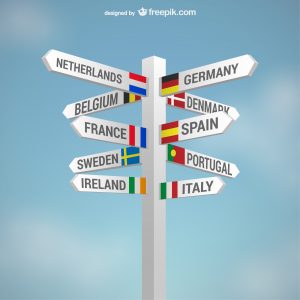
Every year on September 26 the European Day of Languages is being celebrated. The initiative dates back to 2001, the Year of Languages, when the European Commission proclaimed the day to honor the approximately 200 languages of Europe. It is a day full of activities which are also financially supported by the Commission.
What is an official language?
Since 2013, 28 countries are part of the European Union, but only 23 languages are recognized as official languages, i.e., working and contractual languages. For example, Luxembourgish, Catalan, Scottish Gaelic, and Welsh are semi-official languages. Although they are not working or contractual languages, they can be used in written correspondence. Minority languages such as Basque, Fiesian, Sardinian, and Sorbian are not official languages and have no chance of being heard in Brussels. Nevertheless, all these cultures should also be honored, especially on this Day of Languages.
English remains the most important language of communication
Since Brexit took effect on January 31, 2020, Scottish Gaelic and Welsh will no longer be seen in Brussels. But what about English? It remains the most important language and official language, as 38% of Europeans speak it. French follows in second place with 12% and German in third with 11%. For many politicians and civil servants there, it is likely to remain the first choice for direct communication with colleagues without interpreters. Even though French and Spanish are taught in our schools – and German in other European countries – it is rare for a politician to speak fluently any of the European languages that are not taught.
Many language schools, adult education centers, and other educational institutions organize events. The Frankfurt Adult Education Center uses the day primarily to offer paid courses providing basic knowledge of the language, writing, and culture of various European languages. The Offenbach Adult Education Center offers introductory courses in languages that are not so commonly taught: Romanian, Croatian, and Polish. What a great opportunity to get a glimpse into the minds of so many of our fellow citizens for very little money.
In Berlin, for example, the city libraries offer a “language immersion” program for elementary school children and provide insight into the native languages of other population groups. Another language teaching organization takes to the streets of Berlin in velotaxis and on bicycles to “pedal for multilingualism.” And if you want to try out your language skills, “Speak Dating” is the place to be. The best motivation for learning a language is still the experience of communication!
And what are the most commonly spoken languages in Germany? Russian ranks first with approximately 3 million speakers! And yet it is hardly taught in our schools. Turkish and Arabic, however, are now offered as elective subjects in some federal states. Greek occupies a special position, as Greeks living in Germany have set up their own schools, at least in the major cities. For all other native speakers, Ancient Greek is on the curriculum at humanistic high schools, but Modern Greek is more likely to be learned at adult education centers. I found it interesting to occasionally hear Greek spoken on the subway and commuter trains during my studies in Munich
My research for this article revealed another new language that can be found in Germany: Plautdietsch. Did you recognize it? It contains the word “Plattdeutsch” (Low German)! And it is the language of the Russian Mennonites. Since the 16th/17th century, the language has been isolated from Lower Prussian in the region along the Vistula River. After the dissolution of the Soviet Union, many speakers emigrated all over the world: Germany, Asia, North and South America…and most speakers are multilingual, speaking High German, English, Russian, or Spanish. But in South America, there are still speakers who do not understand any other language. There is even a radio station, literature, and award-winning films
GaLaLea doesn’t just offer German language courses—written German, that is, not dialects such as Swiss German, for example. We also offer courses in English and Spanish. And you can even learn non-European languages with us, currently mainly Japanese.